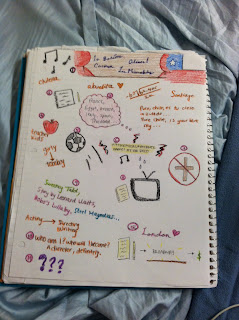Today in class we reviewed the Societal Gender Construction. It starts with a sex category assignment from a doctor. Then it continues to gender status through markers, such as pink clothing for a female child and blue clothing for a male child. Next, it is reinforced by the individual and society, meaning it is pervasive. Then puberty occurs, and gender roles are assigned. I thought it was really interesting that gender was actually something completely made up by our society.
After our review, we made Leadership Life Maps that were creative representations of the significant events in our lives that had helped make us leaders. I drew music notes at the top of my paper, because singing in the San Francisco Girls Chorus was the first experience I had had with leadership and speaking--singing rather, in public. I drew a Chilean flag in the corner of my paper, because I have always been very aware of my heritage and of my cultural identity, and I believe that it has helped shape who I am today. I drew a notebook and pencil, which were symbolic of the time I spent writing short stories as a child. Writing these stories helped me gain a better sense of self-awareness, and I think was a catalyst for my writing plays. I drew a TV with a notebook next to it, representing my want to be a screenwriter and director. The future goal that I drew on my paper said "London," with a heart next to it, and a notebook with the word "broadway" beside it, symbolizing my current aspiration to move to London to write and direct plays.
 |
| My Leadership Life Map |
In our afternoon session, we watched the film Miss-Representation, which focuses on the prejudice, stereotypes, and discrimination women face in everyday life, the political sphere, the media, and other aspects of our society.
At the beginning of the film, we were shown a couple startling statistics: 78% of 17-year-old women are unhappy with their bodies, 65% develop eating disorders, and 17% cut themselves. We also learned that one of the reasons men judge women so harshly is because of the way the media portrays us.
The media is the main cause of unhappiness among the female community. Because women want to look like the edited, photoshopped women they see on TV, they purchase between $12000 and $15000 per year on beauty products. This was sickening to me, even though I wear makeup and contribute to the Cycle of Socialization.
Because women are exposed to the negative side of the media, they practice self-objectification, which makes them depressed, have eating disorders, low confidence levels, lower GPA's, and low political efficiency. Women make up 51% of the US population--51%!--yet they make up only 17% of Congress. Additionally, only 34 women have ever been governors. I think this is extremely unfair, because I personally believe that in most situations, women are better leaders than men. For example, women are more empathetic than men, are better decision-makers, exhibit more integrity, are more democratic, are easier to communicate with, and are more encouraging to employees. You may be wondering where I have obtained this information. I recently read an article by the Huffington Post about why women make better leaders than men, and in addition, we read about the topic in our reading for homework.
Later in the film, I was astonished to learn that only 16% of protagonists in films are female. I could not believe it. Of that 16%, many of them portray an archetype called "the fighting fox toy." In these roles, women can be independent and accomplish their goals, but are objectified, and are essentially there to please the men, having to use their sexuality to gain influence. I thought of Angelina Jolie, an actress whom I had admired for taking on roles in action films, and even getting the part in a film that was meant to feature a male actor. After I thought about the roles she has played, I realized that most of them flaunt her sexuality, which is usually something irrelevant to the character's goal in the film. I also learned that in the 1920s, women were given more complex roles in films. I hope that in my plays I can give women more opportunities to take on roles with more complexity, and encourage them to pursue roles that aren't one-demensional and that only illustrate the physical aspects of women, and the stereotypes that come along with those.
I also saw a clip of Catherine Hardwicke, the director of Twilight, discussing the hardships she has encountered as a female director. From her I learned that only 7% of directors are women. That was a frightening statistic for me. She also stated that when she applied to direct various films, producers would flat out reject her for being a woman, and simply say "no, I think a guy should direct this one." That comment made me livid.
I hope that when/if I go into the professional world of theater, that I will be able to obtain the jobs that I want because I am qualified and because I have earned them, and that I won't be discriminated against because of something completely arbitrary.

No comments:
Post a Comment